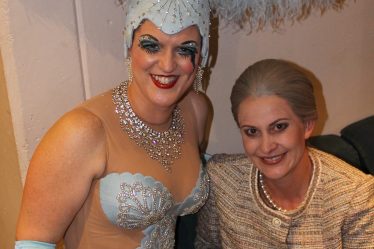
Dear singing students,
Staying motivated during the weeks and months ahead when you will not be able to meet face to face with your teachers and coaches will be a new challenge for us all. Courses and study modules have come to an abrupt stop, rehearsals and performances have been postponed, lessons have been cancelled.
Your goal posts have been seriously moved. No more summer school in Europe, no more chorus work, no more masterclasses or competitions to work towards, no more auditions, no more income, no sign of an end to ‘the crisis’ and, perhaps hardest of all, no more day to day connection with your colleagues.
What we do currently have an abundance of is time. Time can be both a blessing and a curse. Several students have expressed to me that more time means more worry, more frustration, more doubt, more negativity. I think we’re all experiencing some of this as we get used to ‘the new normal.’
We can also view our new time rich circumstances as a wonderful opportunity. Consider spending the next few weeks learning an operatic role, memorising a song cycle, putting together a short recital programme or getting future competition repertoire learnt.
To achieve this we’ll need to find a new routine, a new pattern of learning and a new level of self-accountability. We will need to draw on our reserves of willpower. With few real deadlines in the immediate future it can be difficult to continue to find the motivation to work in isolation.
I’ve put together a few ideas which, although not designed to be comprehensive, I hope might help you navigate these challenging times. Together we can stay professionally on target, remain mentally and vocally healthy and emerge fully prepared when these strange times are over.
Make a plan…
What are your goals during this period? It might help to put your ideas down on paper. Write down your dreams and inspirations so that if you ever find yourself lacking in motivation you can come back and reread this. Consider a personal ‘motivation’ board using words and pictures to inspire you.
How long will it take to learn the role, the song cycle, the audition pieces, the recital programme? Consider mapping out a timeline for yourself and setting goals at short and long intervals. When would you like to have the first recitative learnt? The first act? When would you like to have the role off the book?
What other family and work commitments will you need to work around in order to achieve your goal?
Think about creating a ‘personal statement’ for yourself, a bit like a business mission statement. This could be something like ‘I would like to have the role of ….. learned in two months time,’ ‘ I will work on my technique and breathing for 30 minutes every day,’ or ‘I will commit to an online lesson once a week.’
What will the benefits be when you achieve your goal? How will it make you feel? How will it help your long term ambition?
Manage your time and stick to your strategy…
If possible, organise and create your own private work space.
I’ve often opened opera scores and thought ‘how on earth will I ever learn all this?’ or ‘where will I start?’ Commit to spending a certain amount of time each day to your work and try not to get distracted during this time. turn off technology and social media.
Consider devoting the same time each day to learning. Routine can help achieve goals.
Don’t procrastinate. Prioritise.
Work out who you need to help you reach your goal. Your teacher? A musical or language coach? When will you be checking in with these people? What exactly do you need from them?
Take the time to learn accurately. It’s very hard to unlearn mistakes.
Know when enough is enough. The brain can only cope with so much learning in one day. Take regular breaks and step away for other activities and rest.
Occasionally reset goals as you go along. Have confidence in your ability to be successful. Don’t give up.
Slowly develop your own method of doing things.
Congratulate yourself when tasks are achieved. Celebrate milestones.
Learning the role/the repertoire…
Choosing a score to work from…
Choose to learn or audition for a role which is within your current capabilities and which you think you might sing in the near future.
If you already have the job, find out which score the company is going to work from. Differences can occur between scores in notation, rhythm, dynamics and text, so it pays to do the research first and learn the correct version. Scores sometimes have mistakes in them.
Speak to experienced singers, rehearsal pianists, coaches and conductors about choosing the best edition for your needs.
Consider investing in quality voice/piano scores.
Do you prefer to work from an online score?
Which language will the opera be in?
Are there any traditional cuts? Will the conductor be incorporating these?
Which version of the opera will be used? (Wagner’s Tannhäuser has a Paris and a Dresden version).
Are there any key modifications to various arias?
If you are singing a concert Requiem or similar in Latin, which version of the Latin should you learn?
Listening…
Start listening to a variety of recordings.
Who are your favourite singers in the role/repertoire and why?
How do these singers approach recitative/arias/cadenzas/ornamentation?
What is it about their vocal expression and interpretation that you like?
Listen to the overall impact of the musical score, especially the orchestration.
Listen to different interpretations of tempi and dynamics.
Don’t try to imitate a particular singer; use what you like about their interpretation to inform your own performance
Mark up your score…
Highlight your line or use coloured tabs; find your own system.
Be careful not to miss any parts of the score!
Translation and Language…
One of the best investments for singers is that of language. The more you understand the grammar and words you are singing and that others are singing to you, the more convincing your performance will be. One day you might need to communicate with conductors, singers and teachers in a European language. Anything you do now to anticipate this will make your life easier later.
The language/libretto/poetry informs the emotion, intent and direction of your singing
Don’t rely on given translations as they are often misleading and incorrect. Do your own. Know what every word means. Write yourself a word for word translation and then something more general or poetic.
Read a synopsis.
Read the libretto.
Learn the pronunciation.
Practice speaking the recitatives.
Speak the words through in rhythm.
Do all the above before you actually start singing.
Create your character…
Start with the libretto.
What do other characters say about your character?
Start reading anything relevant regarding history. Think of history as being linear. What else was going on in the world at the time? Art, literature, philosophy, inventions, architecture, politics?
Who are you?
What do you look like?
What are you feeling?
How might you move?
Who do you sing the aria to?
Are you alone on stage or is somebody listening/reacting?
What traditional props might your character use? Are you reading a letter, playing an instrument, holding a sword?
How would you like the audience/other characters to feel when you’ve finished the song/aria?
Are there gaps in the character’s history? Can you fill these in yourself?
Map out the emotional journey of your character through the entire opera. How are they at the end as opposed to the beginning?
Might your character have any particular personality traits or quirks that you could incorporate into your acting?
Most directors are happy that a singer has thought about these things themselves regardless of their concept of the production. There is often very little or even no time to help singers with their character during production rehearsals.
Learning the notes…
Decide where you’re going to start and learn the notes.
Do you start with the arias (often easier as we are usually more familiar with the music), the recitatives (often take longest to learn as they are ‘wordy’) or the ensembles?
Be particular with melody and rhythm.
Think technically when you are learning as well as musically. If there is something particularly difficult in the score then return to your vocalises to practice exercises which will help, for example coloratura, large intervals, chromatic passages.
Consider getting a coach to record your line or the accompaniment if you have trouble doing this yourself
Memorisation…
Repetition, repetition, repetition.
Don’t overdo it in one session or one day. The brain can only cope with so much.
Break things up into manageable chunks.
Sleep on things. You’ll be surprised how much you will probably remember from yesterday’s practice.
Try recalling words at times during the day when you are not practicing like before sleep or on public transport.
Write out the text over and over if that helps you.
Identify musical and textual patterns.
Text notecards; some singers use these although I recommend getting rid of them before the first rehearsal.
I always know I have something well memorised when I can perform other tasks at the same time as singing the music: cooking, cleaning, gardening etc.
Production and movement really help with memory too. The brain links a certain movement or space with particular music.
Coaching and Technical Lessons…
At some point you will need to work on the role with a coach and a teacher.
Professional singers need both of these and should work with both regularly.
It’s also a good idea to get specialised language coachings if you need them.
Happy learning!


